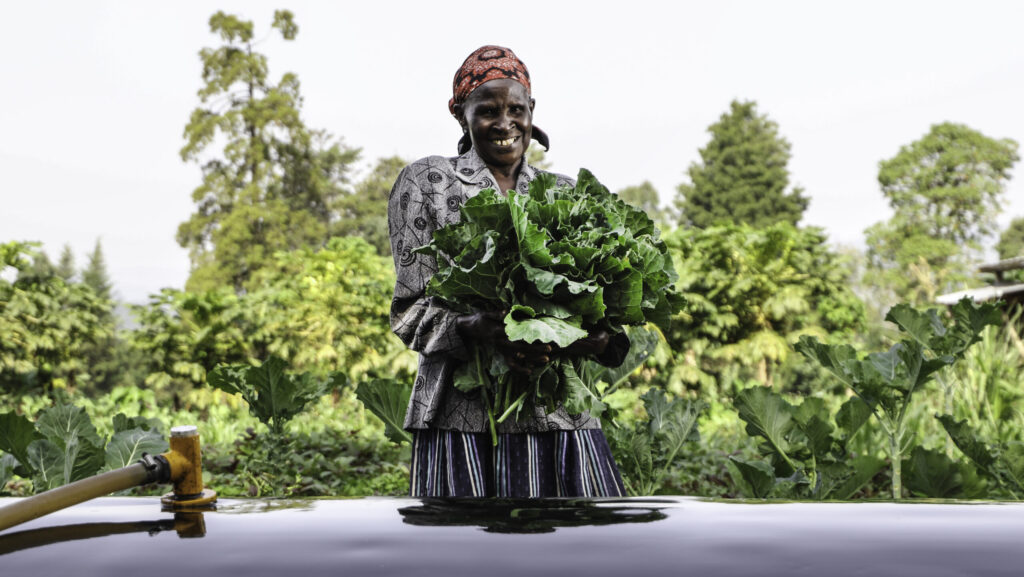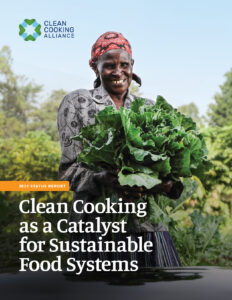NEW REPORT: Clean Cooking as a Catalyst for Sustainable Food Systems
DUBAI, United Arab Emirates, Dec. 3, 2023 — Today, the Clean Cooking Alliance (CCA) released a new report “Clean Cooking as a Catalyst for Sustainable Food Systems,” which sheds light on the energy-food nexus. The report was launched at the 28th United Nations Climate Change Conference (COP28) during a side event at the Sustainable Agriculture of the Americas Pavilion. The report highlights the key role that clean cooking plays in transforming the food system by mitigating climate change and environmental degradation, supporting restoration and climate-smart agriculture, building resilience in agricultural communities, and improving nutrition and food security.
Recent shocks, including the COVID-19 pandemic and the intensifying effects of climate change, have strained global food and energy systems. There is a strong negative correlation between access to clean cooking and food insecurity. Globally, approximately 735 million individuals are facing hunger and 2.3 billion people lack access to clean energy for cooking, relying instead on polluting fuels and stoves to prepare their meals. Despite cooking’s vital role in daily life, the way people cook has been largely overlooked in global food policy discussions.
“Clean cooking is not just about preparing meals; it’s about building resilience and supporting livelihoods,” said CCA CEO Dymphna van der Lans. “The findings in our new report underscore the pivotal role clean cooking plays in transforming our food systems. It is a clarion call for collective action, urging governments, investors, and corporations to recognize clean cooking as a linchpin for resilient, inclusive, and sustainable global food systems.”
Without substantial reforms in our global food system, the consequences of inaction loom large. By 2030, 1.9 billion people could still be without access to clean cooking, while nearly 600 million people will be chronically undernourished. Up to 80 million more could experience hunger by 2050.
Fortunately, we have the knowledge and technologies to provide affordable clean cooking to every person in the world, but only if governments, investors, and the private sector make it a priority. Integrating clean cooking into food policy and programs, and increasing finance and collaboration across the food and energy access sectors, will produce multiplying effects for all other Sustainable Development Goals (SDGs).
 © KM Asad / Clean Cooking Alliance
© KM Asad / Clean Cooking Alliance
“Changing the way people cook is seldom recognized for the crucial solution it represents. Transitioning to affordable, clean, and modern cooking solutions can increase both the quantity and quality of dietary intake, improving overall food security. Initiatives aimed at restructuring food systems must acknowledge the substantial role that clean cooking can play in fostering resilience and supporting food security,” said CCA Chief of Staff and External Affairs Jillene Connors Belopolsky.
The report serves as a call to action, with strategic recommendations for different stakeholders:
- Governments: Prioritize nationwide clean cooking transitions as a key policy measure, integrating clean cooking into food system transformation pathways and nutrition strategies.
- Multilaterals and concessional capital providers: Actively engage in cross-sectoral efforts, enhancing coordination between SDG 2 and SDG 7 agendas. Expand financial instruments to support clean cooking initiatives.
- Donors and investors: Explore opportunities at the intersection of clean cooking, food security, climate, and nature. Promote results-based finance and establish clear metrics for documenting the benefits of clean cooking.
- Agri-food corporations: Incorporate clean cooking into broader strategies, addressing unsustainable fuelwood collection, promoting investments in clean cooking, and exploring distribution channels to improve accessibility.
- Clean cooking companies: Collaborate with agri-food and nutritional organizations to enhance the impact of clean cooking value chains on environmental, health, and livelihood outcomes.
To read the full report, click here.


